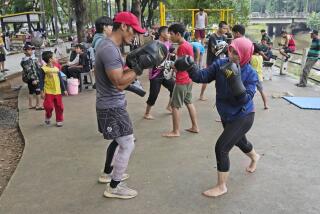Asia Is Conflicted Over Women’s Rights
Not so many years ago it was the Year of the Woman in U.S. politics; women were breaking into politics all over the place. For the first time, California had two women as U.S. senators and it seemed the issue of whether women could have it all was moot. They could, they should and they would. Even in Asia, thought of as a bastion of traditional values, there were stirrings in the Western direction. More and more, Asian women looked to be stepping out of the ancient mold. Country after country gave birth to the heretofore unheard of: women’s rights group. But how much has the status of women in Asia really changed? More than globalization, Islamic militancy, environmental degradation and so on, the question of the Asian woman’s role may be the most difficult issue of all for this region hoping to make the next 100 years the Asian Century.
Asia used to boast that its patriarchal tradition, for all its faults, at least protected its women from the domestic violence so common in the West. But new research is starting to suggest that this isn’t true. Studies at the University of Michigan show that Japanese women, believed to be buffered from high levels of spousal abuse, are actually in the same boat as their counterparts in the U.S. It turns out, for example, that about one-third of all women killed in Japan are slain by their partners, just as in the U.S. According to Mieko Yoshihama, the academic who conducted the study, and who is co-founder of the Domestic Violence Action and Research Group in Japan, violence against women has been hidden behind the thick veil of Asian patriarchal tradition. It is noteworthy that Japan didn’t even open a rape-crisis center until 1982--and the legal definition of domestic violence was last revised in 1907. It is simply not an issue that has been given enough attention throughout Asia, from Japan to India.
The regional pattern comes clearer in another valuable new study conducted by the U.S.-based Asia Foundation. The constitution of Mongolia, for example, failed to accord women equality with men until 1992. India, despite a former woman prime minister, remains a nation over which the outlawed caste system still hangs heavily, with all its restrictions on women. Not until recently had Nepal conducted a single national survey on violence against women. In Sri Lanka, women have had the right to vote since 1931, but even today cultural inhibitions severely restrict the participation of women in politics.
Progress is made difficult by doubts that the Western way is best. Even in Singapore, with undoubtedly the highest percentage of educated career women outside the West, there are second thoughts. In an interview there, Senior Minister Lee Kuan Yew told me: “One of the fundamental global issues is the education of women. I see two extremes between the Japanese and the American ways. The Japanese keep their women in their traditional role. . . . Their task is to bring up the next generation. Work is temporary: The moment they get married and have children, they stop work. [The Japanese] have deprived themselves of half their brainpower and probably about one quarter of their muscle power. But they have done well. Their women have produced the next generation of salaried men.”
The Western way with women leaves Lee and many other Asians unsettled. When colonial Britain withdrew four decades years ago, Singapore’s founding government decreed that women should have the same opportunity and education as men not because of confidence in the cultural philosophy of equal rights but out of economic pragmatism: After all, a male-only work force would be merely half the size of one that included women. Liberating women to work was an economics numbers game. So they went the American way and equalized women in education and in the workplace. Lee sounds regretful now: “I may sound like a male chauvinist but then the next generation is left to [the day care of] television. Children are brought up by television and weekend parents. The price is paid by the next generation. We have unraveled a system that existed for thousands of years from the agricultural era. It is a fundamental problem worldwide. It cuts across all ideological lines.”
Lee’s reservations find deeply embedded resonance across the Asian continent. Perhaps the tsunami of globalization and its concurrent economic winds will roll over all objections--sexist or not--and force Asia to adopt Western values and ways about women. Perhaps the wave of democratization across the region will empower women with the vote and steamroller all reservations. For now, though, many in Asia just aren’t convinced that the West--with its high rate of divorce and juvenile delinquency--has got the basic issue right. In more than one respect, let’s hope they’re wrong.
More to Read
Sign up for Essential California
The most important California stories and recommendations in your inbox every morning.
You may occasionally receive promotional content from the Los Angeles Times.










